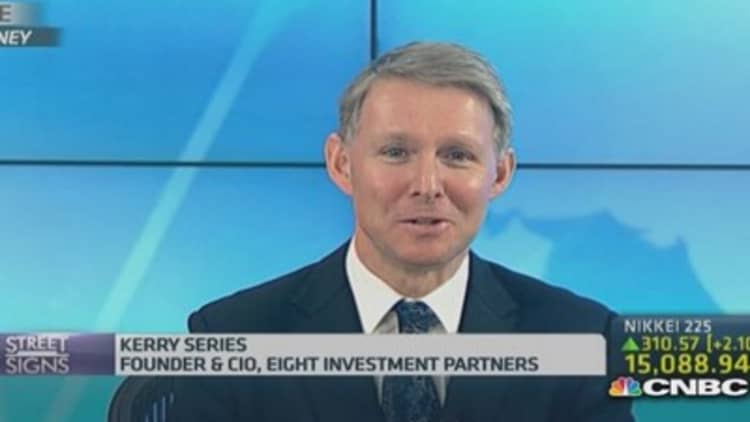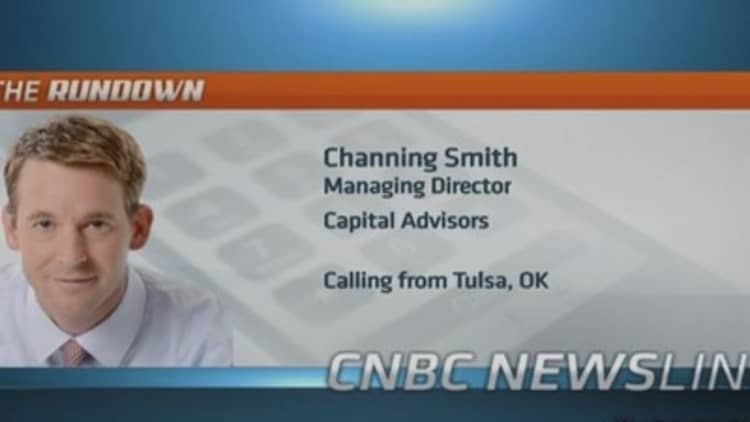European stocks advanced on Monday, tracking gains seen in Asia, as the crisis in Ukraine eased somewhat.
Read MoreUkraine forces close to taking rebel-held Donetsk
Global markets were hit late last week by news of heightening tensions in Iraq, after U.S. President Barack Obama said he'd authorized U.S. military airstrikes. But by Monday, Japan's Nikkei was surging more than 2 percent, after dropping 3 percent on Friday to round out its worst week in two years.
In Europe, the DAX saw stong gains, outperforming other major markets. German companies are seen as particularly exposed to tensions between Russia and the West. The rouble also firmed on news that Moscow had not intervened as Kiev make significant gains in its military offensive against separatists in the east of the country.

According to Evan Lucas, market strategist at IG, positive momentum could be here stay, although he acknowledged that geopolitical risk would continue to lurk in the shadows.
"Conflicts are cooling, and the risk-off events of the past two weeks may see upside risk as de-escalation spreads across the conflicts," he said.
"However interim disruptions similar to that seen last week are very possible. Geopolitics is never far away from interrupting a market's momentum," he added.
Read MoreAsian shares rise as geopolitical fears ebb; Nikkei lead gains
Lucas said the U.S.Federal Reserve's monetary policy would continue to be a positive driver for global stocks, due to his view that the central bank will keep rates lower for longer, despite rising concerns that stronger U.S. economic data could prompt a sooner-than-expected rate hike.
"On a medium-term basis we still see the Fed as behind everything; it has been proven right consistently over the past month on its views on employment slack. The conclusion is that it will follow a very structured path on the raising of rates over the coming years and low rate borrowing will drive investment into the market," he said.
In addition to the military conflict between the U.S. and Iraq which came to a head last week, the Ukrainian conflict - which started rattling markets late last year - moved into its final stages over the weekend. Rebels suggested a ceasefire on humanitarian grounds, while Ukraine is demanding rebels surrender before aid is sent in.
Read MoreStocks ignoring geopolitics? That's nothing new
A Russian invasion of Ukraine remains an ongoing threat, although the U.S., U.K. and German political leaders have all warned Russia that any intervention in Ukraine would violate international law.
"Surrender is looking likely and this could alleviate the markets' concerns," said IG's Lucas.
Meanwhile, in Gaza another 72-hours ceasefire has begun and negotiations are underway in Cairo with the aim of ending the conflict which has now been going on for a month.

Channing Smith, managing director of Capital Advisors, told CNBC Asia's "The Rundown" on Monday that a Russian invasion of Ukraine could trigger a 10 percent correction across global markets, particularly Europe.
"Europe's already suffering so if we see more sanctions, Europe is going to pay the price there," he added.
Read MoreSanctions will deepen euro area deflation
But Smith added that longer term the biggest risk to financial markets was an earlier-than-expected Fed rate hike.
"That is something that everyone needs to pay attention to. Everyone is used to these ultra-low interest rates and everyone is on the same side of the trade... so if we start to see a shift to an increase in rates it's going to impact the value of every asset class... stocks and bonds will take a big hit, but the timing is key," he said.
"Investors to prepare their bond ladders and shorten their duration there and get into more conservative stocks," he added.


